Wed 16 Mar 2022
A Movie Review by David Vineyard: IT HAPPENED IN BROAD DAYLIGHT (1958),
Posted by Steve under Mystery movies , Reviews[3] Comments
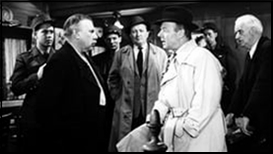
IT HAPPENED IN BROAD DAYLIGHT. Switzerland,-West Germany-Spain, 1958. Original title: Es Geschah am Hellichten Tag. Heniz Ruhmann, Michel Simon, Gert Frobe, Maria Rosa Salgado, Anita Von Ow. Screenplay by Friedrich Durrenmatt (his story), Hans Jacoby, and Director Ladislao Vaja.
This offbeat German noir film is based on Swiss novelist Friedrich Durrenmatt’s novel The Pledge, but takes off from the main conceit of that novel in some interesting directions of its own as a powerful suspense film about the nature of obsession, guilt, and the lengths a man will go to accomplish his ends.
It opens in the woods outside a small town where Jacquier (Michel Simon), a peddler, discovers a child’s body and flees to town and the local pub where he calls chief investigator Matthai (Heniz Ruhmann) who once treated him well.
Matthai is on his last day before a new important job in Jordan, but calls out the authorities and they are guided to the body of the girl by Jacquier who in short order becomes the chief suspect, Matthai only saving his neck from angry locals when he points out that all who claim they saw Jacquier in the woods are just as much suspects as he is.
Matthai isn’t so sure about Jacquier’s guilt though. One of the girl’s friends shows him a picture the victim drew of her friend ‘the giant†a man she met in the woods and befriended. Surely a fairy tale, but …
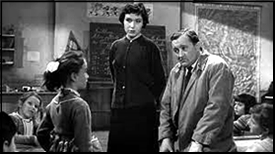
When Jacquier commits suicide under the relentless police interrogation Matthai is not sure he was guilty but the police are happy to close the case and that of other girls who died similarly over the last four years.
Not Matthai though. He continues to investigate and begins to put together a picture of the killer, a man henpecked by his bitter Mother who strikes out in frustration with a razor against the children he has targeted.
Following a trail of clues Matthai closes in on the killer, but knows he can never trap him without the ideal bait, and in a small town he finds it in a lonely little girl like the ones killed before and her widowed mother, Frau Heller and Annemarie (Maria Rosa Salgado and Anita von Ow) . Taking a job at a gas station and living with the mother and daughter he begins to lay his trap.
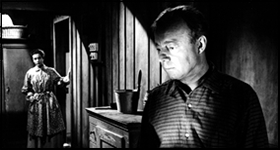
By this point we know the killer is one Schott, a henpecked giant (Gert Frobe) who lives with his cruel mother.
Vajada skillfully inter-cuts scenes of Schott and Matthai almost encountering each other, Matthai filling Schott’s tank with gas as Schott watches Annemarie in his side mirror, the two men passing on the road, all building tension as Annemarie and Schott, her “Magician†meet in the woods and the pressure on Schott from his mother pushes him closer to action and the straight razor in his bath he has used before.
Even with Matthai finally seeing Schott he still has to catch him in the act, but that means using Annemarie as bait, something he cannot do because he has come to care for the child.
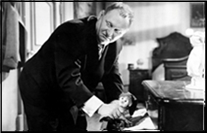
Matthai plants a doll dressed like Annemarie in the woods like the little girl Jacquier found, but Annemarie escapes from her room and heads for the woods to meet with her “Magician…â€
Heinz Ruhmann was a beloved German star in the period perhaps best known here for his films playing Georges Simenon’s Maigret that were dubbed in English and shown on American television in the Sixties. His humanity, gentle screen presence, and surprising strength made him a popular Maigret, but also lend themselves to the drama in the far more complex Matthai, a rather cool character whose cold calculations are complicated by his feelings for a lonely child.
This is supposedly the role that got Gert Frobe the role of Auric Goldfinger in the James Bond film. Around this time he would be introduced in more familiar form to American audience as the police inspector in Fritz Lang’s 1000 Eyes of Dr. Mabuse and its sequel. A hero of the War who smuggled many Jews out from under the Nazis, Frobe would have a successful career in the West in films such as Those Magnificent Men in Their Flying Machines and Bloodlines despite not speaking English.
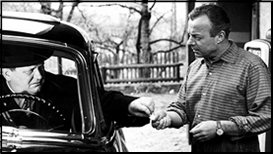
Durrenmatt’s The Pledge was filmed with Jack Nicholson in a form much closer to the book. The author was a noted playwright and novelist perhaps best known among Mystery fans for his Inspector Barlach novels, one of which became a film with Jon Voight and Robert Shaw. His novels and plays often deal with mystery and suspense, but seldom in a straightforward manner. He is far more interested in the psychology of his characters and the paradox involved than straight detection or suspense alone. He’s an extremely important writer, if not always an easy one, and this does justice to his work.
That this film captures so much of the feel of his work despite having to play to a somewhat more standard model is one of its strengths. Evocatively filmed and well acted, particularly by Ruhmann, Simon, and the mute Frobe it plays like the best of film noir with all that implies about flawed wounded human beings, and how they sometimes destroy each other. It is a powerful and disturbing film that can jolt more with the image of a dead child’s hand emerging from a pile of leaves than a hundred gory horror films, a single cry of rage from Frobe when Schott realizes he has been tricked tells more than pages of dialogue about this repressed monster.
I can’t recommend this one enough. It’s hardly a lost film, but one that doesn’t get the kind of attention many of its French and American cousins do in the genre, and that is a shame. You really owe it to yourself to find it on YouTube (there are several versions, but the one by Old Movies B/W and Colour Simonbartbull has English subtitles and is a clear looking print).
See this one. It is a classic.
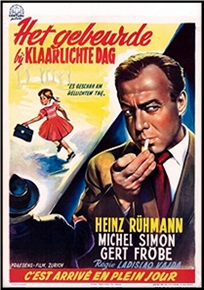
March 16th, 2022 at 10:48 pm
My apologies. I’ve been sidetracked all day, and didn’t get to looking until now. Here’s a direct link to the video of this film that David mentioned:
https://www.youtube.com/watch?v=IxHB_5nSeLk
I’ve not seen the movie nor read the book. Add both to things I have to do. The only book I’ve read by Duerrenmatt is The Judge and His Hangman, which I enjoyed and was also made into a movie, which I’ve been told is good, but add that to the list above also.
March 17th, 2022 at 7:47 pm
JUDGE AND HIS HANGMAN is the one mentioned in the review above filmed with Jon Voight and Robert Shaw as THE END OF THE GAME. It stars Martin Ritt as Barlach and Jacqueline Bissett, directed by Maximillian Schell. The second and last Barlach novel (THE EXECUTION OF JUSTICE) finds him dying in a hospice where he pursues a killer.
Several of Durrenmatt’s plays were filmed including THE VISIT (1964) with Ingrid Bergman and Anthony Quinn about a wealthy woman who returns to the village where she was born and offers them a fortune to execute one of their own and THE DEADLY GAME (1984) with George Segal.
IT HAPPENED IN BROAD DAYLIGHT was also a 1997 television adaptation and filmed as THE PLEDGE (2001) with Jack Nicholson.
March 18th, 2022 at 5:18 pm
[…] At Mystery*File, David Vineyard has reviewed It Happened in Broad Daylight [Es Geschah am Hellichten Tag] (1958). This German-language film, directed by Ladislao Vajda, was the first adaptation of Friedrich Dürrenmatt’s novel The Pledge: Requiem for the Detective Novel. There were several further adaptations, including The Pledge (2001), which was directed by Sean Penn and starred Jack Nicholson. […]